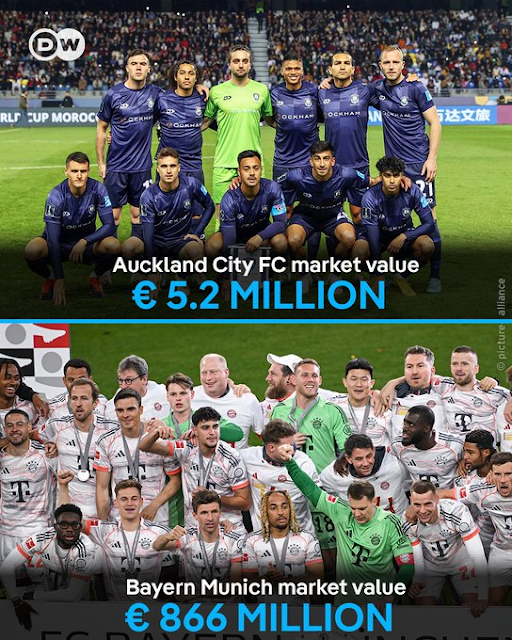- Get link
- X
- Other Apps
- Get link
- X
- Other Apps
Auckland City’s inclusion at the FIFA Club World Cup sparked ridicule, especially after their heavy defeat to Bayern Munich. Ranked 5,072 in the world by Opta, many questioned why an amateur club was even there. But this is less about the team and more about the structure of the tournament.
FIFA’s new 32-team format includes one guaranteed slot for Oceania, which Auckland City has often filled due to the region’s lack of professional teams. New Zealand does not have a domestic professional league, and its two pro clubs Auckland FC and Wellington Phoenix play in Australia’s A-League and are ineligible for the OFC Champions League.
As a result, Auckland City, an unpaid, part-time team, takes up the OFC’s spot. Despite jokes and memes about their performance, this team is made up of players who juggle full-time jobs like sales, real estate, and engineering alongside football. They train in the evenings and rely on volunteers for their facilities.
Their inclusion is not about competing with Bayern on skill, but about representation and opportunity. They’ve earned their place under existing rules, and if there’s a problem, it’s with those rules not with the team that followed them. Auckland City’s journey is a story of heart, hustle, and living the dream most fans only imagine.
Auckland City’s presence at the Club World Cup stems from deep-rooted issues in Oceania’s football structure. The region has no professional league, and New Zealand’s best clubs are blocked from competing in OFC tournaments because they play in the AFC-aligned A-League. That leaves Auckland City New Zealand’s most decorated amateur club as the default choice.
Even though they don’t get paid, Auckland City’s players take unpaid leave from their jobs just to represent their club. Some could not even attend the tournament because they couldn't take time off work. Yet their squad continues to show up, compete, and represent a forgotten region of global football.
FIFA expanded the Club World Cup to 32 teams in a move seen by many as financially motivated. While it brings visibility to clubs from new markets like North Africa, Southeast Asia, and the Middle East, it also puts unpaid teams like Auckland City on the same field as billion-dollar clubs. That contrast is striking and sometimes harsh.
But these are the realities of the sport outside Europe and South America. Until Oceania develops a sustainable professional league, it will keep sending part-time teams. Auckland City is not the problem they are the symptom of a wider imbalance in world football. Any ridicule they face ignores the real structural flaws in the system.
Efforts to fix the professional gap in Oceania are slowly underway. The OFC has proposed an ‘OFC Pro League’ set to launch soon, aiming to bring together eight clubs in a regional professional competition. It would act as a pathway to future FIFA tournaments and bring long-needed investment into the region.
While 24 clubs expressed interest, Auckland City declined to join possibly to avoid making future Club World Cup qualification harder for themselves. The only two professional clubs from the region, Auckland FC and Wellington Phoenix, offered to send their reserve teams due to scheduling conflicts, a proposal the OFC deemed unfit for a serious tournament.
That said, Auckland City’s players aren’t even guaranteed a share of the tournament prize money. Talks are ongoing between New Zealand Football and the club about distributing the funds fairly across the country. This highlights how difficult it is for amateur clubs to survive, let alone thrive.
The criticism Auckland City receives should be directed at the system that placed them in this position. These players proudly say they are playing for the “99.9% of footballers who aren’t professionals,” and they deserve admiration, not mockery. Their presence at the Club World Cup may not challenge the giants, but it does remind us of football’s grassroots spirit and global reach.
- Get link
- X
- Other Apps




Comments
Post a Comment